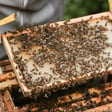
Natalie - Dietitian
What we eat and how we should eat has become WAY more complicated than it needs to be. Being a dietitian is a pathway to help people learn how to eat to achieve their goals, wether thats sports performance, weight loss, general health, food allergies or medical conditions, etc. Natalie has had a successful career learning how to adapt nutrition to do just that and more. After a successful stint at one of the nations best Childrens hospitals, she also provided nutrition guidance to some of the nations top professional sports teams. Now she has taken her experience and knowledge to Missouri State University to help others in their athletic and career goals. If you think that the field of nutrition may be the career for you, this episode will provide an outstanding snapshot into what it takes to become successful.
If you enjoyed this interview and would like to support the show, you can do so HERE. Thanks!



















